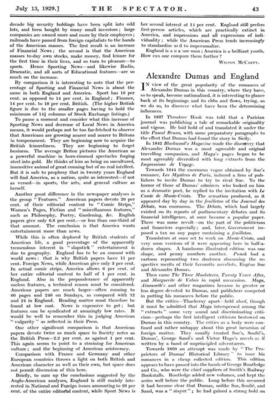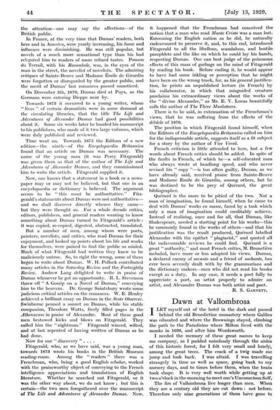Alexandre Dumas and England
IN view of the great popularity of the romances of Alexandre Dumas in this country, where they have, so to speak, become nationalized, it is interesting to glance back at its beginnings and its ebbs and flows, trying, as we do so, to discover what have been the determining influences.
In 1837 Theodore Hook was told that a Parisian journal was publishing a tale of remarkable originality and vigour. He laid hold of and translated it under the title Pascal Bruno, with some preparatory paragraphs to the effect that Dumas had found the story in Sicily.
In 1842 Blackwood's Magazine made the discovery that Alexandre Dumas was a most agreeable and original travelling companion, and Maga's pages began to be most agreeably diversified with long extracts from the Impressions de Voyage.
Towards 1844 the enormous vogue obtained by Sue's romance, Les Mysteres de Paris, induced a firm of pub- lishers to invite Dumas to try to rival Sue. To the horror of those of Dumas' admirers who looked on him as a dramatic poet, he replied to the invitation with Le Comte de Monte-Cristo. The sensation produced, as it appeared day by day in the feuilleton of the Journal des Debats, was enormous. The Debats, which had largely existed on its reports of parliamentary debates and its financial intelligence, at once became a popular paper. There was some revolt—on the part of the politicians and financiers especially; and, later, Government im- posed a tax on any paper containing a feuilleton.
Translators at once set to work on Monte-Cristo, and very soon versions of it were appearing here in half-a- dozen shapes. A handsome illustrated edition was one shape, and penny numbers another. Punch had a cartoon representing two dustmen discussing the re- spective merits of their favourite novelists, Eugene Sue and Alexandre Dumas.
Then came The Three Musketeers, Twenty Years After, and Marguerite de Valois in rapid succession. Maga, Ainsworth's and other magazines became in greater or less degree devoted to Dumas, and publishers competed in putting his romances before the public.
But the critics--Thackeray apart—held aloof, though it must be admitted that Maga interspersed among the " extracts " some very sound and discriminating criti- cism—perhaps the first intelligent criticism bestowed on Dumas in this country. The critics as a body were con- fused and rather unhappy about this great incursion of foreign matter. They usually treated Sue's, Soulies, Dumas', George Sand's and Victor Hugo's novels as if written by a band of unprincipled adventurers.
Towards 1860 an attempt was made by " The Pro- prietors of Dumas' Historical Library " to issue his romances in a cheap collected edition. This edition appears to have passed into the hands of George Routledge and Co., who were the chief suppliers of Smith's Railway Bookstalls. Routledge added new volumes, and kept the series well before the public. Long before this occurred it had become clear that Dumas, unlike Sue, Soulie, and Sand, was a " stayer " ; he had gained a strong hold on the attention—one may say the affections—of the British public.
In France, at the very time that Dumas' readers, both here and in America, were yearly increasing, his fame and influence were diminishing. He was still popular, but novels of a much more sensational type than his had relegated him to readers of more refined tastes. Ponson du Terrail, with his Rocambole, was, in the eyes of the man in the street, the novelist of novelists. The admiring critiques of Sainte-Beuve and Madame ]mile de Girardin were forgotten or disregarded by the greater public, and the merit of Dumas' last romances passed unnoticed.
On December 5th, 1870, Dumas died at Puys, as the Germans were entering Dieppe near by.
Towards 1873 it occurred to a young writer, whose " lives " of certain dramatists were in some demand at the circulating libraries, that the title The Life and Adventures of Alexander Dumas had good possibilities about it. Some six weeks later he handed his manuscript to his publishers, who made of it two large volumes, which were duly published and reviewed.
Time went on. Towards 1875 the Editors of a new edition—the ninth—of the Encyclopaedia Britannica found that an article on Dumas was necessary. The name of the young man (it was Percy Fitzgerald) was given them as that of the author of The Life and Adventures of Alexander Dumas, and they commissioned him to write the article. Fitzgerald supplied it.
Now, one knows that a statement in a book or a news- paper may or may not be believed, but that one in an encyclopaedia or dictionary is believed. The argument seems to be " this must be authoritative." Fitz- gerald's statements about Dumas were not authoritative— and we shall discover directly whence they came— but they were thought so. For a whole decade critics, editors, publishers, and general readers wanting to know something about Dumas turned to Fitzgerald's article : it was copied, re-copied, digested, abstracted, translated.
But a number of men, among whom were poets, painters, novelists, and critics, who read Dumas for their enjoyment, and looked up points about his life and works for themselves, were pained to find the public so misled. Much of what Fitzgerald had written they knew to be maliciously untrue. So, to right the wrong, some of them began to write about Dumas. W. H. Pollock contributed many articles in the Saturday Review and the Fortnightly Review. Andrew Lang delighted to write in praise of Dumas whenever he got an opportunity. R. L. Stevenson threw off " A Gossip on a Novel of Dumas," conveying him to the heavens. Dr. George Saintsbury wrote some judicious critical articles on the romances. W. E. Henley achieved a brilliant essay on Dumas in the. Scots Observer. Swinburne penned a sonnet on Dumas, while his stable companion, Theodore Watts, freely filled pages in the Athenaeum in praise of Alexandre. Most of these good men bestowed kicks and blows on Fitzgerald. They called him the " nightman." Fitzgerald winced, wilted, and at last repented of having written of Dumas as he had done.
Now for our " discovery " . . . .
Fitzgerald, who, as we have said; was a young man, towards 1878 wrote his books in the British Museum reading-room. Among the " readers " there was a Frenchman, who, being a good English scholar, worked with the praiseworthy object of conveying to the French intelligence appreciations and translations of English literature. Whether he searched out Fitzgerald, or it was the other way about, we do not know ; but this is certain—the two men. foregathered over the manuscript of The Life and Adventures of Alexander Dumas. Now. it happened that the Frenchman had conceived the notion that a man who read Monte Cristo was a man lost. Esteeming the English nation as he did, he naturally endeavoured to preserve it, and, to this end, introduced Fitzgerald to all the libellous, scandalous, and hostile pamphlets and the like on which he could lay his hands, respecting Dumas. One can best judge of the poisonous effects of this mass of garbage on the mind of Fitzgerald by reading his book. Before ending it, he would appear to have had some inkling or perception that he might have been on the wrong track, for, as his general justifica- tion, he prints an unpublished lecture (in French) by his collaborator, in which that misguided creature proclaims his extraordinary views about the works of the " divine Alexandre," as Mr. E. V. Lucas beautifully calls the author of The Three Musketeers.
There is to be said, in extenuation of the Frenchman's views, that he was suffering from the effects of the &tickle of 1870.
The position in which Fitzgerald found himself, when the Editors of the Encyclopaedia Britannica called on him for the indispensable article, suggests itself as a fit subject for a story by the author of Vice Versa.
French criticism is little attended to here, but a few words about French critics should be added. In spite of the faults in French, of which he—a self-educated man who always wrote at headlong speed, and who never revised his " copy "—is too often guilty, Dumas, as we have already said, received praise from Sainte-Beuve and Madame Emile de Girardin, among others, but he was destined to be the prey of Querard, the great bibliographer.
Querard is the more to be pitied of the two. Not a man of imagination, he found himself, when he came to deal with Dumas' works en masse, faced by a task which only a man of imagination could creditably achieve. Instead of realizing, once and for all, that Dumas, like Shakespeare, needed a starting point for his works—this he commonly found in the works of others—and that his justification was the result produced, Querard labelled Alexandre with the epithet " plagiarist," and quoted all the unfavourable reviews he could find. Querard is a great "authority," and most French critics, M. Brunetiere included, have more or less adopted his views. Dumas, a declared enemy of savants and a friend of sachants, has ever been severely dealt with by the grammarians and the dictionary makers—men who did not read his books except as a duty. In any case, it needs a poet fully to appreciate a poet, an artist properly to admire an artist, and Alexandre Dumas was both artist and poet.
R. S. GARNETT.

































 Previous page
Previous page